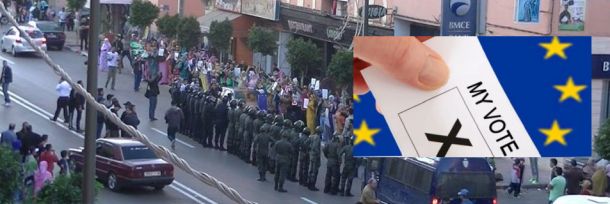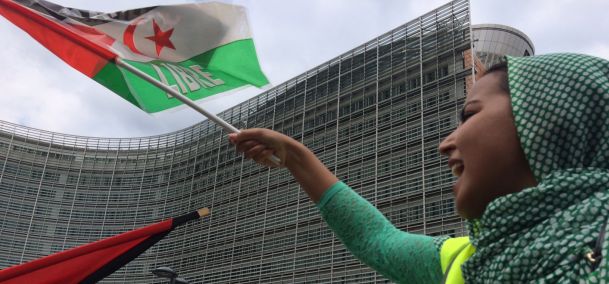
In a new report, the EU Commission elaborates on how Moroccan settlers in Western Sahara are benefiting from a trade agreement that the EU Court of Justice has found illegal.
Photo: Workers heading to the Moroccan king's plantation in Dakhla - of the company Domaines Agricoles. Near all workers in the sector are Moroccan settlers who are permanently or seasonally residing on the occupied land. Picture by Elli Lorz.
On 22 December 2021, the European Commission released [or download] a large report on how the EU-Morocco trade agreement allegedly is for the “benefits for the people of Western Sahara”.
The report - a so-called Staff Working Document - aims to give insight into the results of amending the EU-Morocco trade agreement to specifically apply to Western Sahara, after the EU Court of Justice in December 2016 had ruled the agreement non-applicable in Western Sahara. The Court had argued that since Western Sahara is a territory that is separate and distinct from Morocco, and as the latter has no sovereignty or administering mandate over the territory, EU-Morocco bilateral agreements cannot lawfully affect Western Sahara unless with the consent of the people of the territory. Prompted by Morocco's furious reaction - refusing further collaboration on migration and counter-terrorism - the EU institutions responded to the Court ruling by negotiating an amendment with the Moroccan authorities - and not the people of Western Sahara - that expressly refers to Western Sahara as part of the deal's scope of application.
The EU's circumvention of the 2016 ruling was yet again found invalid in Court ruling on 29 September 2021. The Court repeated and further clarified that the argumentation of benefits to the local population cannot replace the requirement of obtaining consent from the Saharawi people.
Inspite of this, the Commission in its report this week - "2021 Report on benefits for the people of Western Sahara on extending tariff preferences to products from Western Sahara" - seems to systematically ignore the rulings and arguments of its own highest court.
There is no definitinion in the report of the term “people”, nor a clarification that Western Sahara's “population” and “people” are two different concepts. No reference is made to any talks with people of Western Sahara who do not live under Moroccan occupation - either in the part of the territory that is not under Moroccan control, or in exile in refugee camps. Except for in the title on the cover page, the report consistently addresses the “population" of Western Sahara - which are primarily Moroccan settlers. There are no references to the right to consent of the people of the territory.
The document contains data on production in and exports from Western Sahara for 2020, and occasionally also for part of 2021. The document explains that the information was obtained mainly through exchanges with the government of Western Sahara's neighbouring country, Morocco. In addition, the EU Commission and the EU External Action Service (the Union's foreign affairs branche) have undertaken a technical visit to the Dakhla-Oued Ed-Dahab region in occupied Western Sahara from 21 to 23 September 2021 - mere days before the EU Court of Justice would rule that the amended trade deal did not comply with EU and international law and could not be applied to Western Sahara.
The report's main finding is that the amended Agreement “is resulting in benefits for Western Sahara and its population in terms of exports, economic activity and employment” and that “the entry into force of the Agreement and its implementation in 2020 confirmed the expected positive effects in terms of production and in terms of exports”. “The Agreement has thus supported the exports in the two most strategic sectors in Western Sahara - agriculture and fishery - and their growth, and therefore employment and investment”, the report reads, adding that if preferences had not been granted “a very significant part of these activities would have been replaced by exporters from neighbouring countries (which all benefit from tariff preferences with the EU)”.
At present, exports from Western Sahara to the EU concern only two sectors, agriculture and fisheries, which are thus the focus of the document. It is worth recalling that the EU-Morocco trade deal covers both agricultural products and fish products, such as frozen fish, canned fish, fish oil and meal, etc. It does not govern the EU's fishing activities in Morocco that are the subject of the EU-Morocco Fisheries Agreement.
Some of the main elements set forth in the Staff Working Document are summarized below.
With regard to agriculture:
- Both the total cultivated area and the production in Western Sahara has increased in recent years: from 64,000 tonnes in 2016 to 100,000 tonnes in 2020, on a total cultivated area of 1,300 hectares as compared to 900 hectares in 2018.
- The only agricultural exports from Western Sahara to the EU originate in the Dakhla-Oued Ed-Dahab region, where production is mostly destined for export (as opposed to the Laayoune-Sakia El Hamra region which produces mainly fodder crops for local consumption).
- The cultivated area in Dakhla-Oued Ed-Dahab was 900 ha in 2020, yielding 76,000 tonnes of essentially two main market products: cherry tomatoes and charentais melons.
- Exports to the EU reached a volume of 66,700 tonnes in 2020, of which 55,200 tonnes of tomatoes and 11,500 tonnes of melons. Accordingly, 66.7% of the total production in Western Sahara was exported to the EU. That is an increase of 12.3% in comparison to 2019, when 59,400 tonnes were exported to the Union. The 2020 value of the exported products totalled at €79.5 million (€67.07 million for tomatoes and €12.45 million for melons).
- The application of tariff preferences means that in 2020, €8.93 million in customs duties were avoided for tomatoes and melons from Western Sahara.
- The products are not transported directly to the EU, but packaged at conditioning stations in Agadir, “where they are subject to the necessary phytosanitary checks before being exported”.
- The wind-powered desalination plant in Dakhla (a project carried out by Engie) will add another 5,000 hectares of irrigated farming land. The land will be allocated to interested investors through a competitive bidding process. Larger plots of 100 ha each will be alloted to 5-6 leading companies, while smaller plots will be given to young entrepreneurs. Housing will be created and provided for interested farmers. Production is expected to be up and running by 2025, and will concentrate on high value products such as cherry tomatoes, cranberries and blueberries, “the latter two with the US market in mind”. It is estimated that the desalination plant will generate a yearly added value of €47.5 million. Work on the plant and wind park will start in December 2021 or January 2022.
With regard to fishery products:
- In 2020, 954,000 tonnes of fish products were captured and landed in Western Sahara, with a value of €502.2 million. While captures related to fish products were lower in 2020 than in 2019 (1,067,000 tonnes), the total exports of fish products to the EU in 2020 was significantly higher in 2020 than in the year before. In 2020, the EU imported 140,500 tonnes with a value of €412 million. In 2019, exports to the EU had amounted to 124,000 tonnes worth €447 million. There was thus an increase in exports of 13.3% in volume and a decrease of 7.8% in value.
- The Moroccan authorities put the number of establishments authorised to export to the Union at 172 in 2020, up from 141 in 2018. EU TRACES, as of November 2021, puts that number at 166.
- Morocco has indicated its intention to continue developing the fishing industry in Western Sahara “through the facilitation of access to land for fish processing establishments and to fishing licenses”.
On the Technical visit by EU officials to Dakhla on 21-23 September 2021:
- The visit took place at the invitation of Morocco, and was preceded by discussions in Rabat with representatives of the Moroccan government, and by talks in Casablanca with the Confédération Générale des Entreprises du Maroc (CGEM) and FOODEX. All these entities unsurprisingly stressed the importance of applying the Agreement to Western Sahara, to ensure predictability of the trade regime which is important for attracting investments. FOODEX, where the sanitary and quality control measures were discussed, raised that tomatoes from Dakhla are not mixed with those from Agadir or elsewhere in Morocco.
- In Dakhla, representatives from the EU Commission and EEAS visisted three fishery processing and aquaculture factories, two agricultural farms, an agricultural vocational training centre and two social cooperatives, while also meeting with the Chambers of Agriculture and Fisheries and the governor of “the region”, in addition to “the authorities in the region”.
- One concern raised by producers was the desire to export directly from Dakhla to the EU without having to pass through Agadir, which involved additional costs. They did however expect the future new port of Dakhla to resolve this matter.
The report also contains several paragraphs on a “consultation with human rights organisations active in Western Sahara”. That meeting took place on 4 November 2021, with the objective of “seeking their view on the impact of the Agreement on the population of Western Sahara and on the use of natural resources”. A footnote reveals that the EU Commission's interlocutors were in fact three Moroccan organisations: The Conseil National des Droits de l'Homme, the Observatoire du Sahara pour la Paix et la Démocratie et les Droits de l'Homme (OSPDH) and the Commission Indépendante pour les Droits de l'Homme (CIDH AFRICA). Of note is that the Commission allegedly had also invited EuroMed Rights, Frontline Defenders and the Polisario Front, who had declined attending. The participating Moroccan organisations “expressed their support for the extension of preferential tariffs to Western Sahara", that ”the inhabitants of Western Sahara benefit directly and indirectly", and “indicated that, on the basis of their experience, there was also a strong support for the Agreement from the population living in the territory”. The document goes on the state that the Moroccan NGOs had “reported positive developments regarding the human rights situation in Western Sahara, with some emphasising the need to distinguish between human rights defenders and biased, politically motivated actors. They indicated that publically known Sahrawi activists generally enjoy a large margin of freedom to express their opinion on different issues, both as individuals and as associations.” In the chapter called “Overall framework and fundamental rights”, the report does admit that “official international sources on the human rights situation in Western Sahara remain scarse". Yet in spite thereof, the report does state that the Agreement has contributed to the ”constructive cooperation on the protection of human rights, which could have been otherwise affected or compromised. Moreover, it can be inferred that the overall contribution of the said agreement to the socio-economic development of Western Sahara has also had a positive spill-over effect on the protection of human rights".
This time, the Commission does not claim to have been in dialogue with 94 Saharawi and international groups that it has never met. The Commission has on several occasions in the past spoken untruly to the EU Member States about who it has actually been in dialogue with.
The chapter on the impact of the Agreement highlights developments as regards agriculture, fisheries, tourism and renewable energy as the main sectors driving the economy in Western Sahara, characterised as “a market economy in expansion”. Nevertheless, the report does state that “data to determine the share in the GDP of each sector in Western Sahara are not available”, and that “although Western Sahara has relatively higher GDP per capita levels than surrounding regions, the economy is largely export-driven”.
The phosphate sector is briefly touched upon, revealing that there are no exports of Western Saharan phosphates to the EU because there is not yet a production of processed phosphate products in the territory and that there is no interest in the EU for raw phosphates from the territory. The document does state that “raw phosphates from Western Sahara are likely to be used in Morocco to manufacture phosphate derivatives that are then exported to the EU under preferences”. This is incorrect. There are no transports of phosphate from Western Sahara to Morocco. The illegal phosphate exports from the territory is covered in WSRW's annual reports P for Plunder.
Since you're here....
WSRW’s work is being read and used more than ever. We work totally independently and to a large extent voluntarily. Our work takes time, dedication and diligence. But we do it because we believe it matters – and we hope you do too. We look for more monthly donors to support our work. If you'd like to contribute to our work – 3€, 5€, 8€ monthly… what you can spare – the future of WSRW would be much more secure. You can set up a monthly donation to WSRW quickly here.
EU elections: how have candidates voted on occupied Western Sahara?
Are you casting your vote for the EU elections? Find here a complete overview of MEP candidates who have supported the Moroccan occupation of Western Sahara in previous controversial votes. Choose wisely.
UK High Court confirms EU Court rulings on Western Sahara
The UK Court has concluded that the UK government has acted unlawfully in granting preferential tariff treatment to products from Western Sahara through a deal with Morocco, and in granting fisheries quota's for fishing in Western Sahara under a fish deal with Morocco.
EU Court reaffirms position on Western Sahara
Polisario has a case, but it should be pursued when the time is right, Court implies.
Saharawi groups object to EU's Western Sahara trade plans
No less than 93 Saharawi groups have called on the EU institutions to respect the will of the people of Western Sahara when negotiating trade or fisheries agreements that will affect their occupied land.


